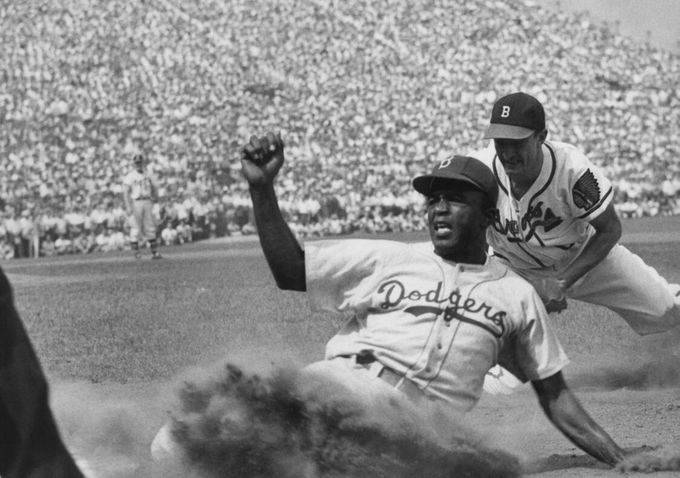 Ken Burns, the patron saint of public television, has already made more than 20 hours of essential American sports history with his 1994 epic “Baseball” and its four hour addendum in 2010, “The Tenth Inning.”
Ken Burns, the patron saint of public television, has already made more than 20 hours of essential American sports history with his 1994 epic “Baseball” and its four hour addendum in 2010, “The Tenth Inning.”
Now he takes time again, in four hours over two nights, beginning tonight and concluding Tuesday to tell the tale of one particular player, “Jackie Robinson” (PBS, 9 p.m., check local listings).
As far as timing, Burns knows just what he’s doing.
It’s the second full week of baseball, for one thing, he says. “More important than that is that it precedes April 15th. Friday is the anniversary, and that, as probably most of you know, is the day every single ball player in Major League Baseball wears the number 42, a number which, with the retirement of Mariano Rivera from the New York Yankees, is now a number not used and is the only number retired in every single stadium in the United States.”
Because he preserved while breaking the color barrier, Burns said, “without a doubt, the most important person in the history of baseball is Jackie Robinson. He may not be the best baseball player, but he is, without a doubt, the most important baseball player. And so a gathering around April is a sign of respect.”
For Burns, “Jackie Robinson” is more than a sports story, though.
“Jackie Robinson.” says Burns, “is a history of race relations in the 20th century as well as we hope our film is a complex family drama, multigenerational drama and, may I say, something that documentaries don’t get into too much, an extraordinary love story.”
But it’s a love story complicated by the country’s history of race relations, as well.
Rachel Robinson, 93, recalls the story of their courtship and honeymoon, for example.
“We were deeply in love,” she told reporters at the TV Critics Association winter press tour earlier this year, and “had waited five years to get married. We were engaged for five years. We had an agreement that we would not get married until I finished college and he had a job.”
Branch Rickey offered Robinson a job on the 1946 Brooklyn Dodgers organization just about the time she graduated, she said. So they went off to spring training together, though they were bumped off all the scheduled flights, had to take a bus, where they were told to ride in the back.
“And because the hotels would not let us room in the same place where the team was in, a very nice black family put us in a little tiny room in their home at the top of a staircase, and that was our haven.
“The next morning, we went out and tried to have breakfast in the neighborhood,” Robinson said. “We went to three different restaurants. They would not have us. They would not serve us. We came back to the house where we were staying, climbed those stairs, went into that tiny bedroom.
“I went downstairs, to the lady’s kitchen, and found a bowl of boiled eggs in the refrigerator, and that was our breakfast,” she says. “The only triumph we had in that situation was that we didn’t go hungry, and we didn’t get angry with each other. The tension wasn’t between the two of us. The tension was between us and that community. And so often that was how we had to deal with discrimination.”
I asked Robinson how she liked being in the public eye at 93 to help promote the film.
“I’ve sort of been in the public eye for a long time, in one way or another, and I have not sought that. It has come to me, and I’ve had to be ready to respond,” she says. “It’s important for me to be here, and it’s important for me to support the film, and Ken, because he has put in so much effort and talent into this film. I want to be there, even if I can’t hear.”
More than that, she added, “I’m proud of Jack. I’m proud of what he did, I’m proud of his part in history, and I would be there to support anything that’s going to elaborate on what he has been doing did in his lifetime.”
The four hour series concludes Tuesday.